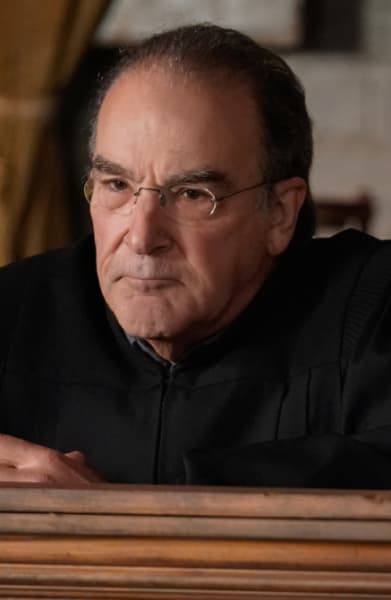The road to hell is paved with good intentions.
Diane had the best of intentions when she left that anonymous tip for the Feds on The Good Fight Season 5 Episode 3, but now there’s a real chance Kurt could be facing jail time.
It’s an intractable situation Diane has found herself in, but if there’s any lawyer that can get Kurt off, it’s her.
Things do not look good for Kurt at the moment.
Even though we know he had nothing to do with the Capitol attack, there’s a pile of evidence mounting against him, further compounded by his refusal to name names.
Diane: I’m your wife, which means that anything you tell me is privileged communication, so this is not the time to be the taciturn mountain man. Just tell me. Tell me everything.
Kurt: About?
Diane: Who did you take shooting?
Kurt: Veterans with PTSD. I volunteered to shoot with them on Saturdays. They’re not criminals.
Diane: Then just give the FBI their names and explain that.
Kurt: One of these veterans said he was going to DC and he wanted a tour of the Capitol. I called a congressional office to arrange it.
Diane: When was this?
Kurt: On January 5th.
Diane: Which congressperson?
Kurt: I’m not gonna say.
Diane: Kurt, I can’t tell anyone.
Kurt: I’m not gonna say.
Diane: OK, you’re not gonna talk to the Feds again. I’m gonna talk to them.
Kurt: You think I’m in trouble?
Diane: Yes, I think you’re a Trump official who trained an insurrectionist in firearms.
Kurt: I didn’t train…
Diane: And then arranged for them to scout the Capitol. I think that’s the definition of trouble.
From Agent Starkey’s point of view, Kurt could very well be the mastermind behind the events on Jan. 6.
He taught insurrectionists how to use AR-15s, instructed them on where to get the ammunition, and even arranged a tour of the Capitol for Jan. 5.
All that’s missing is a smoking gun, and Starkey could have enough to send Kurt to prison.
Kurt’s best bet is Diane, but it’s also somewhat ironic, seeing as this entire mess is her fault.
Had Diane not tipped off the Feds, Kurt wouldn’t be in this situation.
So, naturally, when Kurt finds out Diane is responsible for his predicament, it’s going to spell trouble for their marriage.
The marrieds have been through a lot already, but this may be something from which they can’t come back.
Sure, things looked bleak when Kurt cheated on Diane, but his infidelity never endangered her livelihood or freedom.
To Kurt, it won’t matter that Diane never meant for this to happen. All he’ll see is a wife he can’t trust.
Diane: Wow, I’m surprised Mr. Pike didn’t accuse Kurt of being responsible for 9/11.
Madeline: Certainly, you have a better joke than that.
Diane: No, this isn’t a joke to me. Dylan Pike will say anything to reduce his sentence.
Madeline: I do consider his statement with some skepticism, and the only way to get to the truth is with a grand jury. A subpoena has a tendency to sharpen the senses.
Diane: Odd you don’t have a musical cue for that.
Madeline: Hold on. Oops, that’s not right. I can always subpoena you, Kurt.
Kurt was adamantly against turning in Dylan Pike, something Diane very well knew, but she did it anyway.
And even though Dylan Pike was one of the insurrectionists, Kurt asked Diane to let it go, but she didn’t.
Diane put her sense of morality over her husband’s wishes, and whether right or wrong, her marriage is in jeopardy because of that.
And with the heavier stuff out of the way, we can focus on all of the absurd fun the episode managed to include, namely the continuation of the 9¾ Circuit Court subplot.
Judge Wackner and his makeshift court in the back of Copy Coop are indeed a breath of fresh air, and the idealist in me is right there with him.
As we’ve discussed, there are aspects of the system that are broken, and Judge Wackner is single-handedly trying to fix them.
Is it crazy? Absolutely. A wild goose chase? Probably. Is it still admirable? Completely.
And despite all of the reasons why Wackner’s facsimile may be a fool’s errand, something inside me is still rooting for him to succeed.
This is television, after all. So what’s a little suspension of disbelief among viewers?
Diane: What can I do for you, sir?
Wackner: I want to hire you.
Diane: You want to?
Wackner: Hire you, your firm. I did my research, and I’m willing to pay your retainer.
Diane: Are you being sued?
Wackner: No, I’m creating a courtroom, and I need to know the best way to do it.
Diane: We don’t do that, sir.
Wackner: But you do try to make money.
Diane: We do.
Wackner: I’m willing to pay money. I looked online. One of your services is consultation on legal issues. Your website is incredibly insistent on that. Well, I need consultation, and I’m willing to pay.
Diane: Mr. Wackner, I don’t like what you’re doing.
Wackner: And I’m not trying to convince you. I’m using your skepticism, and the incentive of capitalism to acquire your services to perfect my little clubhouse of the law. I want you and I want Marissa to help me.
Diane: Our retainer is not… it’s sizable.
Wackner: I got money.
Diane: Why are you doing this, sir? It’s not going to benefit you.
Wackner: It’s odd. I might talk for a while, so just let me. Since the ‘80s, people have been discussing everything, ‘cause if it’s built on, what can benefit or disadvantage. You remember a time before that? People used to want to write the great American novel and not sell out. Build a beach sculpture, fly to Ecuador, help people. Do you remember the last time you heard those words ‘Peace Corps?’ I do. I want a new Peace Corps for America.
Diane: I’ll have downstairs draw up a retainer agreement.
Wackner asking Marissa to be his law clerk was somewhat predictable but great nevertheless, as it allows the former investigator the chance to do some lawyering before passing the bar.
She’s way too capable of being relegated to paperwork daily.
It was a bit surprising that Wackner sought legal consultation services from Reddick, Lockhart & Associates, but it makes perfect sense in hindsight.
Wackner wants to simultaneously expand the scope of his courtroom while eliminating injustices in the criminal justice system.
So what better recourse than to hire a law firm of staunch opponents to guide him.
Plus, that way, he gets Marissa to be his law clerk, and after meeting David Cord, a Republican businessman who’s willing to shell out millions on whatever causes he deems worthy, money no longer seems to be an issue.
Wackner may have said he could afford the firm’s sizable retainer, but with Cord’s backing, he definitely can. As for this David Cord character, he’s harder to get a read on.
His claims about wanting to save the country were pretty broad and unspecific, but when you can drop millions on a dime, you’re deemed eccentric rather than crazy.
Cord’s desire to fund a client’s lawsuit against Chumhum smelled of ulterior motives from the beginning, but as soon as Section 230 was mentioned, the reasons didn’t matter.
David: I want to save the country.
Liz: You want to save it?
David: Yes, don’t you?
Liz: Yes.
David: January 6th changed everything for me, my Road to Damascus moment. Do I have to explain that to Democrats?
Liz: No.
Julius: And I’m not a Democrat.
David: That’s my point. I came to realize we — say the three of us — have a lot more in common that we might think. We all love this country. I love this country. It gave my family a start. My dad, he started a small laundry business, sent his son to college, and I made something of myself. Too many people take America for granted. I don’t, and I suspect that you don’t either.
Liz: Well, I don’t think there’s a disagreement there. I think the disagreement is in the detail.
David: Well, let’s start with the details then.
Any time the series delves into legal issues surrounding journalism, it’s like catnip for the reporter in me, and this time was no different, especially since I spent some time last fall learning about Section 230 in graduate school.
For those who need a reminder, Section 230 generally provides immunity for website platforms from third-party content, meaning Facebook, Twitter, Google, etc., can’t be held liable for the obscene or offensive content users leave.
Hearing Liz and Julius argue that Section 230 is unconstitutional because it violates the freedom of the press was pretty great, and if the series wants to solely focus on cases at the intersection of the law and journalism, I wouldn’t be mad.
Lastly, Carmen found herself representing another high-profile slimeball, trading in a murderer for a rapist.
Again, it’s hard to get a read on who she is and what she stands for, as all we know at this point is she’s willing to do whatever it takes to be noticed by the name partners.
It’s still unclear whether her nonchalance about representing the worst of humanity is an act or not.
If she doesn’t care if her client is the devil incarnate, then that’s problematic, but only because it’ll be hard for us to care about her as a character.
We have no problems rooting for anti-heroes and outright villains sometimes, but that’s only once we’ve learned their sad backstory or seen a glimpse of their humanity.
With Carmen, we have nothing about her past to fall back on, so unlike Wackner, who’s amiable to the tenth degree, it’s hard to muster any feelings toward her.
Liz: You’re representing Craig Wolf-Coleman?
Carmen: I think I am.
Liz: Did you pursue him?
Carmen: Of course not.
Liz: You know what he’s accused of?
Carmen: Yes, I looked over the case last night.
Liz: And it doesn’t bother you?
Carmen: I don’t understand. Should it?
Liz: Carmen, is there anyone you would not represent?
Carmen: Wouldn’t? I don’t understand. Is there someone you don’t want me to represent?
Liz: No, I’m just trying to get a sense of who you are. Is there anyone? Someone?
Carmen: Alan Dershowitz.
Liz: Why?
Carmen: I don’t know. Don’t like him.
Liz: OK, all right, here’s what I want. As your mentor, I’m going to help you with the Craig Wolf-Coleman case.
Carmen: Thank you.
Liz: And I want us to keep talking about your career path.
Carmen: Are you worried about me?
Liz: I don’t know what I am about you.
If she is play-acting and simply trying to get ahead at the firm, that’s way more interesting, but again, for us to care about her, we need to be let in on who Carmen is as a person.
Of course, Liz is just as confused as we are, unable to get a read on Carmen. The young lawyer’s tactics seem to be working for now, as Liz has taken Carmen under her wing for the time being.
However, if Carmen steps out of line and does something to make the firm look bad, she’ll be sent packing. That is unless David Lee has something to say about it.
Yes, the power-hungry lawyer has been made the new Gavin Firth and the de facto boss, as the writers continue to wrap up the last of loose ends from the prior season.
Promoting David Lee, while annoying, does allow the series to play with new power structures and hierarchies while also uniting Diane, Liz, and the other senior partners against a common enemy.
Replacing Diane with a Black name partner doesn’t have the same urgency when you’re fighting to keep David Lee from destroying the firm you spent years building.
Because as irritating as David Lee can be, he makes a compelling villain and can reign havoc on everyone’s lives. There is such fun to be had here.
Some stray thoughts:
-
Kudos to the series for continuing to tackle the tough issues. Many shows wouldn’t have incorporated the Capitol attack in such a respectful but equally compelling way. Lesser shows would have tried and failed, but not The Good Fight.
-
Did you miss The Good Fight Shorts? It’s been ages since the series stopped to educate us, and that catchy tune about Section 230 made me remember how much I enjoy these. Plus, it was about Section 230, so that was the icing on top.
-
Given that Emily in Paris is such a garbage show, did anyone else momentarily wonder if the fanfiction could actually be better than the TV series? Fanfiction typically gets a bad rap in certain corners of the internet, but it can actually be quite good. Not that you would know that if this is your only frame of reference.
-
That was a shitload of Build-A-Bears. That is all.
So what did you think, Good Fight Fanatics?
How much trouble is Kurt in?
Do you love what Wackner’s trying to do?
What’s your take on Carmen?
Don’t forget to hit the comments below to let me know your thoughts.
Jessica Lerner is a staff writer for TV Fanatic. Follow her on Twitter.












